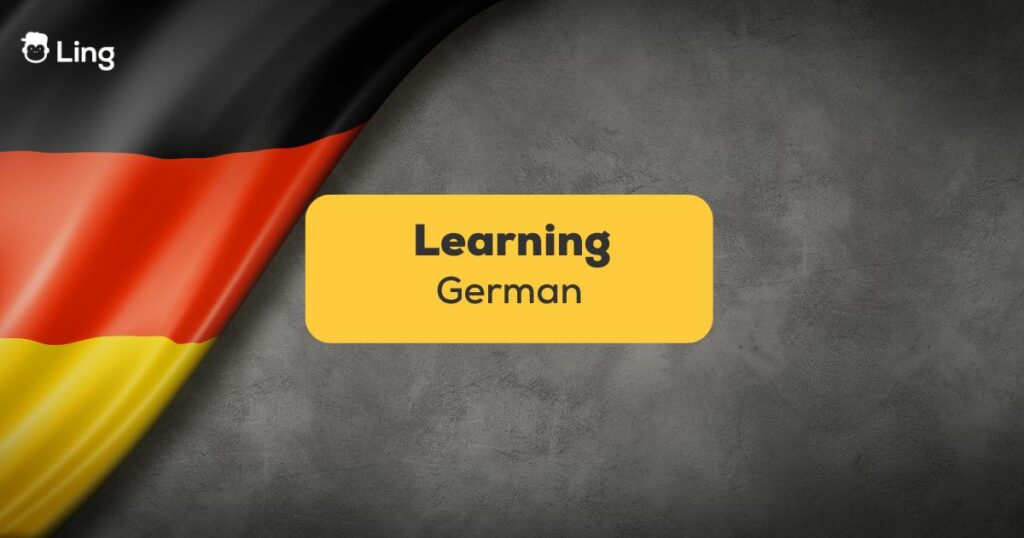Trust me, I know—learning a language can be very frustrating and challenging. As part of my studies at university, I chose to study German, without much prior knowledge of it! Needless to say, I spent many hours sitting behind a desk trying to make sense of all the rules of German grammar.
But I have good news for those interested in doing the same. It’s not impossible to learn German with some persistence and hard work. In this blog post, we’ll be going over some rules and exercises that you can do, to help you get started and also explain a bit about how I learned German.
While I had a lot of help available to learn the language, such as professors and intensive uni courses, I have a few ideas about good ways to learn German, and I’ll tell you all about them. We’ll talk about the basics and the tips that helped me out. Learning this language might seem tough, but with a bit of effort and the right approach, you’ll get there. Let’s dive in and make German seem less scary together!
I Started Learning From The Basics!
If you’re at the beginner level, and you want to learn German, there are a few basic things you should consider. Learning the alphabet, greetings, numbers, telling time, and some basic vocabulary is always a good start. Once you have a simple idea of how the language works, then you can pick up a grammar book and get into the harder stuff.
1. Understanding The Articles In German
The first thing you should remember when learning nouns in German is that each and every one comes with an article! There are masculine, feminine, and neuter articles. Here’s an example of each of them:
- Der Tisch (the table) – masculine
- Die Mutter (the mother) – feminine
- Das Bett (the bed) – neuter

2. Practicing Some Nouns In German
Nouns in German can also be feminine, masculine, and neuter. But there’s a way to more easily remember a noun’s gender: Most nouns have endings that are typical for that gender.
Nouns with these endings are usually feminine:
| Ending | Example | English Translation |
|---|---|---|
| -e | die Blume | the flower |
| -ie | die Familie | the family |
| -ei | die Bäckerei | the bakery |
| -enz | die Existenz | the existence |
| -anz | die Eleganz | the elegance |
| -heit | die Freiheit | the freedom |
| -keit | die Schönheit | the beauty |
| -tät | die Universität | the university |
| -ik | die Musik | the music |
| -tion | die Aktion | the action |
| -sion | die Diskussion | the discussion |
| -schaft | die Mannschaft | the team |
| -ung | die Handlung | the action |
| -ur | die Natur | the nature |
Nouns with these endings are usually masculine:
| Ending | Example | English Translation |
|---|---|---|
| -er | der Lehrer | the teacher |
| -el | der Apfel | the apple |
| -ig | der König | the king |
| -ist | der Journalist | the journalist |
| -ant | der Elefant | the elephant |
| -or | der Motor | the motor |
And nouns with these endings are usually neuter:
| Ending | Example | English Translation |
|---|---|---|
| -chen | das Mädchen | the girl |
| -lein | das Büchlein | the booklet |
| -ment | das Element | the element |
| -um | das Museum | the museum |
| -tum | das Eigentum | the property |
| -o | das Auto | the car |
If you try to memorize these endings, you’ll have an easier time getting the gender of the noun right! Keep in mind, there are always exceptions (i.e. Der Käse – the cheese).
3. Cases: What Are The 4 German Cases?
There are four cases in German – the nominative case, the genitive case, the dative case, and the accusative case. Let’s dig in a bit more!
It was challenging for me to learn German, especially grappling with cases and declensions. In German, the case system is a set of rules guiding how nouns, pronouns, and articles show whether they’re the subject, object, or other elements.
So, we have established that there are three articles – die, der, and das. But sometimes they turn into dem, den, des?! And there are four cases!
How to make sense of all this? What I did to remember article endings was memorize this exact table:
| Case | Masculine | Feminine | Neuter | Plural |
|---|---|---|---|---|
| Nominative | der | die | das | die |
| Genitive | des | der | des | der |
| Dative | dem | der | dem | den |
| Accusative | den | die | das | die |
Then, you need to learn what they mean in a sentence and how to use the correct articles and nouns.
Here are some examples:
- Nominative: Das Auto (The car)
- Genitive: Die Farbe des Autos (The color of the car)
- Nominative: Der Mann. (the man.)
- Accusative: Ich sehe den Mann. (I see the man.)
- Nominative: Der Lehrer
- Dative: Er hilft dem Lehrer. (He helps the teacher.)
4. Familiarize Yourself With The Verbs And Past Tenses
Knowing the most common German verbs is so important! I would recommend memorizing a long list of verbs to start getting fluent. Now get ready for the not-so-fun part: there are two main past tense forms in German: Perfekt, commonly used when speaking and in informal writing such as emails and messages, and Präteritum, more formal and mainly used in written texts. Oh, and verbs can also be regular or irregular.
| Verb | Präsens | Perfekt | Präteritum |
|---|---|---|---|
| spielen (regular) | Ich spiele (I play) | Ich habe gespielt (I have played) | Ich spielte (I played) |
| sein (irregular) | Ich bin (I am) | Ich bin gewesen (I have been) | Ich war (I was) |
Immerse Yourself In The Culture And The German Language
When I started learning, I found that learning the rules and reading about the German language can often lead nowhere. I also found that if you aren’t in Germany or surrounded by the language every day, there are other ways to immerse yourself in the language. One of the things I did was listen to audio materials such as podcasts and songs from German (and Austrian) authors.
And pro tip if you want to become fluent more quickly: watch movies and series you’ve already seen in English, or your native language, synchronized into German. Take a pen and paper and write down all words that are unfamiliar to you, look them up, and try using them in a new sentence.
Another thing to do is to speak German with other people who are also learning the language, to practice your skills and see what part of your speech still needs improvement! I found all these tips extremely useful when I wanted to improve my German.

Become A Fluent German Speaker!
While all of the above has proven to be effective and helped me, so I could learn faster, there is another thing you could do as well. Have you ever tried a language-learning app? The Ling app is very effective when it comes to language lessons, with a way to make language learning fun and keep you motivated!
Download it now from the App Store or Google Play Store, and by the end of the day, you’ll be able to pick up on some basics and grow your knowledge from there!



































































